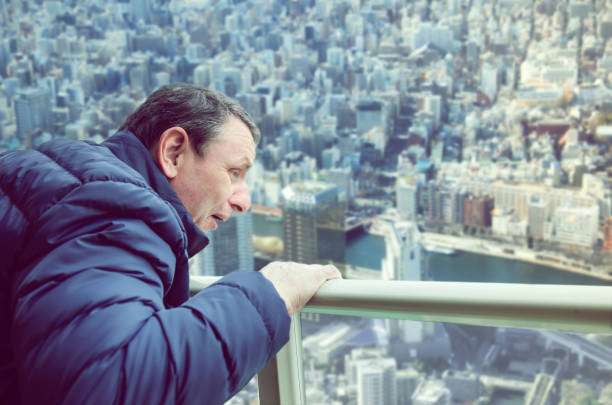Understanding the Fear of Heights
Being scared of heights, also known as acrophobia, is a common fear that affects many people worldwide. This fear can range from mild discomfort to intense anxiety when exposed to high places such as balconies, bridges, or mountain trails. While some level of caution around heights is natural, excessive fear can impact daily life and limit activities.
In this article, we will explore the causes of acrophobia and seven effective ways to overcome being scared of heights.

If you need professional support, consulting the best psychiatrist in Delhi can provide valuable insights and personalized strategies for Phobias. Consider Visiting:
Causes of Being Scared of Heights
Several factors contribute to the fear of heights, including:
- Evolutionary Instincts: Humans have an inherent survival instinct to avoid high places, reducing the risk of falling.
- Past Experiences: A traumatic fall or witnessing someone else fall can trigger a lifelong fear.
- Genetics and Family Influence: If close family members have acrophobia, you may be more likely to develop it.
- Inner Ear and Balance Issues: Problems with the inner ear, which controls balance, can make heights feel more intimidating.
7 Effective Ways to Overcome Being Scared of Heights
1. Gradual Exposure to Heights
One of the most effective ways to stop being scared of heights is through gradual exposure therapy. Start by looking at pictures of high places, then watching videos, and slowly progress to real-life exposure. For example:
- Stand on a small stool or step and get used to the height.
- Progress to standing on a balcony with a railing.
- Visit a high place with a supportive friend.
This step-by-step method helps desensitize your fear over time.
2. Practice Deep Breathing and Relaxation Techniques
When facing heights, your body may respond with a rapid heartbeat and dizziness. Practicing deep breathing can help:
- Inhale deeply for four seconds.
- Hold the breath for four seconds.
- Exhale slowly for six seconds.
Additionally, progressive muscle relaxation (PMR)—where you tense and relax different muscle groups—can reduce overall anxiety.
3. Challenge Negative Thoughts
Being scared of heights is often fueled by irrational thoughts, such as “I will fall” or “The building will collapse.” Instead, challenge these thoughts with logic:
- Buildings, bridges, and observation decks are built with strict safety measures.
- You have control over your body movements.
- Many people safely enjoy high places every day.
By replacing fear-based thoughts with rational ones, you can reduce anxiety.
4. Strengthen Your Sense of Balance
Since balance issues can contribute to being scared of heights, improving your vestibular system can help. Try:
- Yoga and Tai Chi: These exercises enhance balance and stability.
- Walking on Uneven Surfaces: Practicing on sand, grass, or balance beams improves spatial awareness.
- Focusing on a Fixed Point: When at a height, looking at a stable object can reduce dizziness.

5. Seek Support Through Therapy
For severe acrophobia, cognitive-behavioral therapy (CBT) can be highly effective. CBT helps individuals recognize and restructure their thought patterns related to heights. Many mental health professionals offer exposure therapy in a controlled environment to help individuals overcome their fear gradually.
For more information on mental health therapies, visit the National Institute of Mental Health (NIMH).
6. Use Virtual Reality (VR) Exposure Therapy
Modern technology has made it possible to simulate high places without actually being in them. VR exposure therapy allows individuals to experience heights in a safe and controlled way. Studies show that repeated exposure in a VR environment can significantly reduce fear responses in real-life situations.
For research on phobia treatments, visit the National Center for Biotechnology Information (NCBI).
7. Develop a Positive Mindset
Mindset plays a crucial role in overcoming fears. Some tips include:
- Visualization Techniques: Imagine yourself confidently standing at a height.
- Encouragement and Reward: Celebrate small victories, like climbing a few steps higher than before.
- Surround Yourself with Supportive People: A positive support system can boost confidence.
8. Role of Medical Interventions in Managing Fear of Heights
While psychological techniques and gradual exposure remain the most effective ways to overcome acrophobia, some individuals with severe anxiety related to heights may benefit from professional medical interventions. Consulting a mental health expert can help assess whether additional support is needed. In some cases, therapy combined with professionally guided interventions can provide short-term relief from intense anxiety, making it easier to engage in exposure therapy and coping techniques.
When to Seek Professional Help
If being scared of heights interferes with daily life, travel, or work, professional guidance may be necessary. A licensed therapist can assess your level of acrophobia and recommend treatment options.
For professional mental health resources, visit the Substance Abuse and Mental Health Services Administration (SAMHSA).

Final Thoughts
Being scared of heights is a common yet manageable fear. By gradually exposing yourself to heights, practicing relaxation techniques, and adopting a positive mindset, you can regain confidence and control. If your fear is overwhelming, professional therapy and virtual reality exposure can offer significant improvements.
Overcoming acrophobia takes patience, but with the right approach, you can enjoy breathtaking views without fear.

